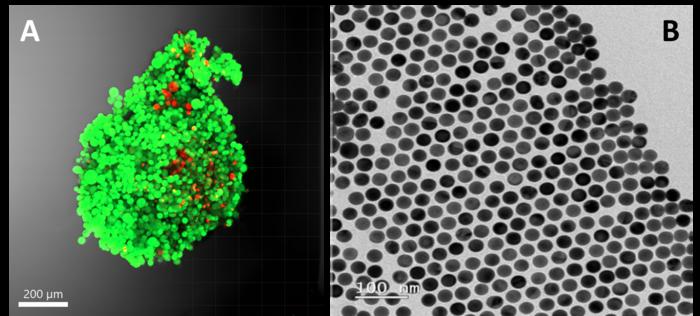Pablo S. Valera, a pre-Ph.D. researcher, completed a study just published in PNAS. The study highlights the potential of Surface-Enhanced Raman spectroscopy (SERS) in investigating metabolites released by cancer cells.
 (A) Fluorescence photography of a 3D fibroblast culture (a healthy cell type) and (B) image of the gold nanoparticles used in SERS technology. Image Credit: Pablo S. Valera / CIC biomaGUNE
(A) Fluorescence photography of a 3D fibroblast culture (a healthy cell type) and (B) image of the gold nanoparticles used in SERS technology. Image Credit: Pablo S. Valera / CIC biomaGUNE
Led by Ikerbasque Research Professors Luis Liz-Marzán of CIC biomaGUNE and Arkaitz Carracedo of CIC bioGUNE, and with participation from other researchers from both centers who are also members of the Networking Biomedical Research Centre (CIBER), the study offers important insights to direct more focused experiments to uncover the role of such metabolites secreted in the environment or tumor microenvironment, potentially leading to novel therapeutic approaches.
Tumor and healthy cell interactions create a complex ecosystem known as the tumor microenvironment. It is a dynamic pseudo organ that controls how cancer begins and spreads. The emphasis of interest has shifted from protein messengers, which facilitate intercellular communication, to metabolites, or tiny molecules, released into the extracellular space by tumors.
There are few traditional methods for monitoring these metabolites in intricate cellular environments; nevertheless, surface-enhanced Raman spectroscopy (SERS) has become a viable substitute because of its ease of use.
In this study, a SERS-based strategy proposes “investigating metabolites secreted by tumor cells lacking methylthioadenosine phosphorylase (a common genetic event associated with poor prognosis in various types of cancer, such as breast cancer and glioblastoma,” according to Pablo S. Valera.
He added, “SERS is a spectroscopic technique that uses gold nanoparticles to detect molecules in a biofluid. It is a fairly fast technique, in which no pre-treatment of the samples is required.”
Cellular Communication Brought About by Metabolites Secreted by Tumor Cells
By using SERS, the researchers found that these cells secrete purine metabolites that can be metabolized by healthy cells, leading to molecular changes that are consistent with the aggressiveness of cancer; this explains the tumor environment's reprogramming in cancers with methylthioadenosine phosphorylase suppression, which has never been observed before:
Valera noted, “We were able to detect this metabolite, not only in tumor cells but also in the rest of the healthy cells that are in contact with the tumor cells. So we detected that there is a relationship between tumor cells and healthy cells by means of this metabolite, and that it also brings about a change in the behavior of healthy cells so that to a certain extent they help the tumor to develop.”
He added that “unraveling the complexity of such interactions in cancer patients could, in turn, pave the way for new therapeutic approaches.”
This study’s effective application of SERS shows how quickly metabolic interactions in complicated settings can be captured with this technology. In actuality, SERS’s outstanding sensitivity and easy, quick signal gathering fit the criteria for becoming a front-line instrument that could later direct more focused analysis.
By using complementary approaches for monitoring, a comprehensive image of the metabolic state of the tumor microenvironment can be produced. It is also critical to emphasize that research has shown that SERS and other analytical techniques work well together.
Journal Reference:
Valera, P. S., et. al. (2023) SERS analysis of cancer cell-secreted purines reveals a unique paracrine crosstalk in MTAP-deficient tumors. PNAS. doi:10.1073/pnas.2311674120